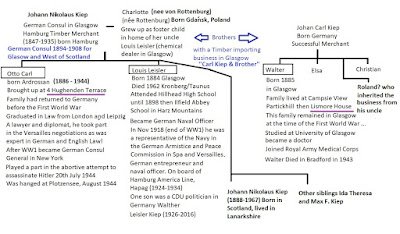Lismore House, a tale of two families, a German Consul and a German Hero!
A story of two families and a Scottish born German Hero involved in the plot to assassinate Hitler ...
Lismore House on Kelvin Drive is a Grade B listed detached house which was certainly occupied by a "Mrs Kiep" as she is listed on the Address book below. Two German brothers, with the name of Kiep, set up "Carl Kiep & Brother" in Glasgow, importing timber.
Lismore House overlooks a bend in the Kelvin River. The house still contains many period features, including marble fireplaces, German light fittings, wood panelling and carvings. The other house connected with the family (early 1900s) is at 4 Hughenden Terrace.
115 Kelvin Drive (glasgowwestaddress.co.uk)
The River Kelvin from Lismore House
I have attempted an excerpt of a family tree for the two families involved ...
Johann Nikolaus Kiep was the German Consul in Glasgow until 1914 when war broke out and the family quickly disappeared once hostilities broke out and they never returned to the house.
One half of the family lived at Hughenden Terrace and included Otto who was a hero of the German Resistance and involved in the plot to assassinate Hitler:
Johann Nikolaus Kiep (1847 -1935)
- Records of the German Club of Glasgow, 1893-, cultural society, Glasgow, Scotland - Archives Hub (jisc.ac.uk)
- and his grave in Germany - Johannes Kiep – Wikipedia
- He studied German Literature at University of Glasgow and his wife Charlotte studied Italian University of Glasgow :: Story :: Biography of Johann Nicolaus Kiep
Charlotte Kiep
Otto Kiep - a forgotten hero
- Otto Kiep - Wikipedia
- The German Resistance: The WWII Story of Otto and Hanna Kiep – World War 2 History Short Stories (ww2history.org)
- Otto Kiep (spartacus-educational.com)
Walter Kiep:
Louis Leisler:
An interesting Thesis - Migrants and Internees - Germans in Glasgow 1864 - 1918 - includes a lot of references to the Kieps .... (if anyone reads this please send any updates that I can add to this page!)
Migrants and internees : Germans in Glasgow, 1864-1918. - Durham e-Theses
Patents for Hydraulic parts / turbine parts... one of the Johann Nikolaus Kieps ..... see google
Map Reference: Eurowalk 3: West End Wander





Comments
Post a Comment